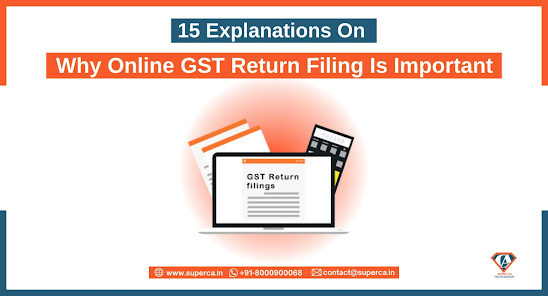A GST return contains all the details of sales, purchases, tax collected on sales and tax paid on purchases that need to be filed compulsorily by all registered taxpayers. Once you file GST returns, you will need to pay the resulting tax liability i.e money that you owe the government.
The details of sales and purchases of the goods and services plus the tax paid and collected have to be furnished by all registered individuals, traders, organizations, and companies. Such details are submitted by online GST return filing and on the basis of this, the tax authorities calculate tax liability.
Who should file a GST return?
Under the GST Regime, all registered dealers are required to file the return irrespective of the type of business or turnover or profitability during the return filing period. Even a dormant business that has obtained registration under GST must do an online GST return filing.
Two monthly returns and one annual return are to be filed by a regular business having more than Rs.5 crore as annual aggregate turnover which amounts to 26 returns in a year. The number of GST filings varies for quarterly GSTR-1 filers which are 9 in a year, including the GSTR-3B and annual return. There are separate GST returns required to be filed in special cases, like for composition dealers who have to carry out online GST return filing 5 times a year.
Importance of GST return filing
1. Late Fees
Late fees will be levied on the taxpayer if he/she fails to file the returns on time. As per the GST Law, the late fee is Rs.100 for each day for each Central Goods and Services Tax (CGST) and State Goods and Services Tax (SGST). Thus, the total fine amount will be Rs.200 per day with a maximum of Rs.5,000. However, this is subject to changes as notified by the government.
2. Restrictions in filing subsequent returns
In case the taxpayer is not filing the GST returns then the subsequent returns cannot be filed. For instance, a new rule 59(6) has been inserted which gives restrictions in filing GSTR – 1 if GSTR – 3B has not been filed. The GSTR-1 return filing facility will be blocked for taxpayers who have not filed GSTR-3B for the previous two return periods.
3. Simple Return Filing process
The entire process of GST return filing is online via the portal created by the authorities. It requires a list of receipts, invoices, and bills to be kept handy. The process is easy to understand and follow, given that the business or the entrepreneur is first registered for GST.
4. Unified Platform
GST is a multi-stage and destination-based tax framework that has supplanted several indirect taxes in the country, such as VAT, service tax, and excise duty, thus providing a unified platform of Indirect tax framework all over India.
5. Intention of fraud or tax evasion
An offender who is not paying taxes or is making short payments must pay a penalty of 10% of the amount of tax due subject to a minimum of Rs.10,000. Hence, to avoid heavy penalties it is better to get
online GST return filing done on time as it will also lead to a cascading effect.
6. Lesser compliance
The government has reduced the complexity of tax filing for businesses to a great extent by combining various taxes into a single tax GST. Under the previous tax regime, businesses had to file multiple returns accorded with different indirect taxes – VAT, excise, and service tax. As GST is a unified and singular tax regime, the number of filings has come down, making it less hassle for entities to file a return.
7. Ease of Doing Business
Implementation of GST has also Improved the ease of starting a new business in India without any difficulties as it is centralized as well as standardized. Thus, the business would no longer have to file multiple indirect tax returns as GST returns apply across India.
8. Improving efficiency of logistics
Before GST, all state governments had applied their own different tax structure when it came to Octroi and CST applicability for interstate transportation of goods. But under GST, these restrictions on inter-state movement of goods have been lessened thus reducing the tax significantly for the movement of goods & services across multiple states resulting in reducing transportation and logistics costs.
9. Cancellation of GST registration.
In some cases, GST Registration can be cancelled if GST Returns are not filed. But before doing so, the tax authorities will initiate recovery proceedings; however, before such initiation, notices and reminders must be served.
10. Ease of access and flexibility
Online GST Return filing is a transparent process to keep financial transactions accountable. And because it’s online, it provides the benefit of ease of access and flexibility.
11. Restriction on E-Waybill Generation
The restriction of the E-Way bill will be applicable in case if two consecutive GST returns like GSTR 3B are not filled. It will be restricted for all types of outward supply of that person. One can generate e-way bills only after filing GST.
12. Benefits to startups
GST has benefitted newcomer small businesses, start-ups especially, as they do not have to run from one place to other for getting information about registrations and filings of VAT, excise, and service tax.
13. Organized return filing procedure
It was often seen that before the implementation of GST, tax filing systems in India, especially construction and textile were largely unregulated and disorganized. GST has brought accountability and regulation to these industries by making its return filing procedure smooth and organized.
14. Enhances taxpayers’ credibility
Timely and proper online GST return filing benefits taxpayers at the time of seeking loans from a bank or financial institution. Taxpayer’s credibility is evaluated based on his GST returns.
15. Higher threshold
The threshold for GST registration is annual aggregate turnover exceeding 40 lakhs for sale of goods and an aggregate turnover exceeding 20 lakhs for sale of services which means that small businesses falling below this threshold limit are not liable to online GST return filing.
Final Thoughts
Ignoring timely filing of GST returns may lead to arising unnecessary consequences. You will also be liable to pay interest and a late fee if
online GST return filing is not done within the due date. Hence, being an honest citizen of our country and to get our records clean, we must get it filed within the given time period.





Comments
Post a Comment